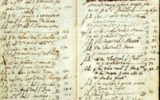Galileo, Engineer: The astronomer’s experiments appeal to an engineer’s mind
by Matteo VALLIERIANI
The interested reader may have noticed how historians in recent decades have attempted to deconstruct the identity of Galileo Galilei. He is no longer just the great astronomer or even just the founder of the modern experimental method in science. Even the political value of his work and his life, systematically reconsidered in the frame of the debates about the relation between Church and research institutions or between religion and science, is no longer the single relevant perspective for approaching this kind of historical thread. Thanks to the work of historians of science of the last twenty years, readers are now used to very different interpretations. Galileo is now also a heretic, a revolutionary martyr, a mathematician, an Aristotelian natural philosopher, an artist – almost with brush and palette in his hand – and finally a gifted courtier. This, however, is only an apparent process of fragmentation. Historiographically speaking, a process of this kind tends to cancel categories such as “genius” from scientific activities and their histories. Such categories are used to justify the impossibility of explaining historical phenomena. In other terms, the actual history of science requires science and its history to remain rational activities. For this reason, it is relevant to undertake an investigation of Galileo in all of his contexts.
